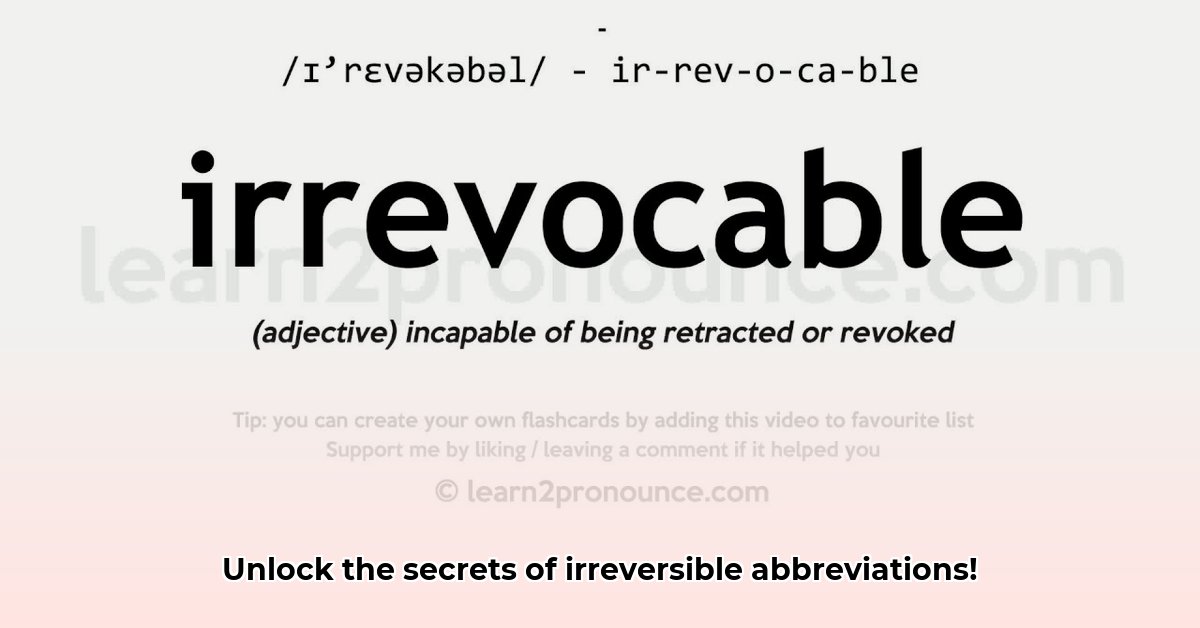
Irrevocable Abbreviation: A Linguistic Analysis
The question of whether a standardized abbreviation exists for "irrevocable" yields a definitive answer: no. This article analyzes the reasons behind this absence, examines prevalent misconceptions, and offers guidance for maintaining clarity in various writing contexts. The lack of a commonly accepted abbreviation highlights the importance of precision, particularly within legal and formal writing.
The Absence of a Standard Abbreviation: Why?
Several factors contribute to the lack of a widely accepted abbreviation for "irrevocable." Primarily, the word's infrequent usage compared to more commonplace terms diminishes the need for a shorthand. Furthermore, the potential for misinterpretation outweighs the convenience of abbreviation, especially in contexts demanding precision (e.g., legal documents, contracts). The risk of ambiguity, with potentially significant consequences, renders any abbreviation insufficient.
Secondly, the inherent legal and professional weight of "irrevocable" necessitates unequivocal clarity. The semantic nuances of the term cannot be confidently compressed into a shorter form without risking miscommunication. Even informal abbreviations, like "irrevo," lack standardization and carry an air of casualness unsuitable for formal contexts.
Misconceptions Regarding "Irrevocable" Abbreviations
The use of shortened forms of "irrevocable," such as "irrevo," should be restricted to informal contexts. Using such abbreviations in formal writing is strongly discouraged due to the potential for misinterpretation and its implications in legal and official documentation. The precise meaning of "irrevocable" —incapable of being revoked or annulled—demands uncompromised clarity.
Best Practices for Handling "Irrevocable" in Writing
The most effective strategy is consistently using the full word, "irrevocable," regardless of context. This approach guarantees clarity and avoids any potential ambiguities.
A Practical Guide:
Formal Writing: Always utilize the full term. Precision is paramount in legal, academic, and business communications. Ambiguity is unacceptable.
Informal Writing: While abbreviated forms might be considered in casual settings (e.g., emails or social media), the potential for miscommunication necessitates caution. Using the full word remains the safest approach.
All Other Contexts: The full term is consistently the most dependable option. This simple practice eliminates any risk of confusion.
Contextual Considerations and Stakeholder Recommendations
The appropriate approach to handling "irrevocable" varies across different professional fields.
| Stakeholder Group | Recommended Approach |
|---|---|
| Legal Professionals | Always use the full word "irrevocable." Precision outweighs brevity. |
| Academics | Consistent usage of the full term is crucial for maintaining academic rigor. |
| Business Professionals | The full word ensures clarity and professionalism in most business communications. |
| Educators | Emphasize the importance of precision in language; promote using the full word. |
Conclusion: Prioritizing Clarity
The lack of an established abbreviation for "irrevocable" underscores the crucial role of clear communication. In situations where precision is paramount, the full term should be preferred. The potential consequences of misinterpretation justify the consistent use of the complete word "irrevocable" in all formal settings. Clarity and accuracy consistently outweigh the perceived benefits of brevity.